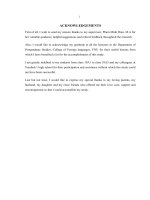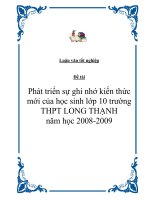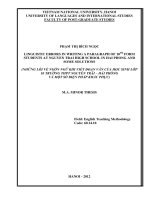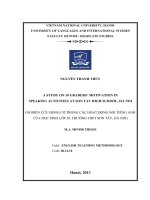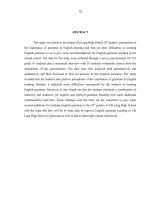Nghiên cứu về hiệu quả của các dạng bài tập nối đối với sự cải thiện từ vựng của học sinh lớp 10, trường THPT đinh tiên hoàng, tp ninh bình
Bạn đang xem bản rút gọn của tài liệu. Xem và tải ngay bản đầy đủ của tài liệu tại đây (280.28 KB, 11 trang )
VIETNAM NATIONAL UNIVERSITY, HANOI
UNIVERSITY OF LANGUAGES AND INTERNATIONAL STUDIES
FACULTY OF POST-GRADUATE STUDIES
LÊ THỊ VIỆT HÀ
AN INVESTIGATION INTO THE EFFECT OF MATCHING
EXERCISES ON THE 10TH FORM STUDENTS’ VOCABULARY
IMPROVEMENTS AT DINH TIEN HOANG HIGH SCHOOL
IN NINH BINH CITY
Nghiên cứu về Hiệu quả của các dạng bài tập nối đối với sự cải thiện
từ vựng của học sinh lớp 10, trường THPT Đinh Tiên Hoàng,
Tp. Ninh Bình
M.A. MINOR PROGRAMME THESIS
Field: English Teaching Methodology
Code: 60140111
HANOI - 2015
VIETNAM NATIONAL UNIVERSITY, HANOI
UNIVERSITY OF LANGUAGES AND INTERNATIONAL STUDIES
FACULTY OF POST-GRADUATE STUDIES
LÊ THỊ VIỆT HÀ
AN INVESTIGATION INTO THE EFFECT OF MATCHING
EXERCISES ON THE 10TH FORM STUDENTS’ VOCABULARY
IMPROVEMENTS AT DINH TIEN HOANG HIGH SCHOOL
IN NINH BINH CITY
Nghiên cứu về Hiệu quả của các dạng bài tập nối đối với sự cải thiện
từ vựng của học sinh lớp 10, trường THPT Đinh Tiên Hoàng,
Tp. Ninh Bình
M.A. MINOR PROGRAMME THESIS
Field: English Teaching Methodology
Code: 60140111
Supervisor: Dr. Dương Thi Nu
̣ ̣
HANOI - 2015
DECLARATION
Title:
An Investigation into the Effect of Matching Exercises on the 10th form
students’ Vocabulary Improvements at Dinh Tien Hoang High School
in Ninh Binh City
I certify that the thesis is the result of my own research for the Degree of Master of
Arts at University of Languages and International Studies, Vietnam National
University, and that this thesis has not been submitted for any degree at any other
university or tertiary institution.
Date submitted: Hanoi, 30 / 10 / 2015
Student
Lê Thị Việt Hà
1
ACKNOWLEDGEMENTS
This research has been accomplished with the help and encouragement of many
people to whom I would like hereafter to express my deep appreciation.
First and foremost, I would like to express my great attitude to my supervisor, Dr.
Dương Thị Nụ for her invaluable inspiration, assistance and guidance during the
time I tried to complete this paper.
I am thankful to all lecturers and staff of the Post-Graduate Department of
University of Languages and International Studies, Vietnam National University for
their scientific knowledge, guidance and enthusiasm during my course.
My sincere thanks go to my teachers and grade 10 students at Dinh Tien Hoang
high school, Ninh Binh City for their support and participation in my research.
And my heartfelt thanks are due to my dear family members who are always beside
me to support and encourage me to fulfill my study.
2
ABSTRACT
This research was conducted to investigate the effect of matching exercises on
grade 10 students’ vocabulary improvements. Two grade 10th classes majoring in
natural sciences were selected and divided into control and experimental groups.
This is a quasi-experimental study which aimed at establishing the positive impacts
of matching exercises on students’ vocabulary improvements in comparison with
the conventional teaching and learning of vocabulary at most high schools in Ninh
Binh at present. In this experimental study, 43 grade 10 students applied matching
exercises for a period of 4 months in school year 2014-2015 while 43 other students
belonging to the control group followed the conventional teaching and learning. The
subjects’ vocabulary gains were measured by a vocabulary test on lexical aspects
such as word meaning, vocabulary recognition and production in different contexts.
Both pretest and posttest were administered in chronologic order, before and after
the experimental program. T-test which was employed to make a comparison
between pretest and posttest scores gained by two groups demonstrated that the
experimental group had made more improvements in the English vocabulary than
the control group. Moreover, the participants’ responses to the questionnaire also
showed that most students who used matching exercises regularly found them very
effective. This result supported the empirical findings mentioned above and
reemphasized the outstanding benefits of matching exercises to the learning and
teaching L2 vocabulary at high schools in the future.
3
PART A. INTRODUCTION
1. Rationale
Vocabulary knowledge has an important role in almost all areas of language
learning. According to Nation (2001), “vocabulary learning is not a goal in itself; it
is done to help learners listen, speak, read, or write more effectively” (p.362).
Therefore, learning a language depends on learning its vocabulary. Stoller and
Grabe (1993) stated that development of vocabulary knowledge is highly necessary
for both native and nonnative speakers. Hulstijn et al. (2005) believed that “If one
does not know the meaning of the words occurring in a text, understanding is
severely hampered” (p.54). Hence, learners should pay attention to the words as a
part of a message and individual words as well (Nation, 2001). Reality shows that
many students have fairly good knowledge of grammar but are hardly able to
express themselves properly because of their vocabulary deficiency. Vocabulary
learning, therefore, becomes the central to language acquisition and interest in its
role in second language learning has grown rapidly in recent years. Scholars and
teachers now emphasize the need of systematic and principled approach to
vocabulary by both the teacher and the learner (Decarrico, 2001; Nation, 1990). One
of the concerns in vocabulary is how to help students acquire their English
vocabulary.
However, at senior secondary schools, the teaching and learning of English
language in general, English vocabulary in particular are still far from satisfaction
as students’ final results in most English examinations remain unchanged at low
levels. In fact, most secondary school students have not paid enough attention to
vocabulary learning as they mainly receive basic lessons of grammar together with
four skills from their teachers and textbooks. Many grade 10 students’ English
vocabulary is still limited even though they have learned English for four years at
the lower secondary school. It is their limited vocabulary that explains their poor
performance in using English and in their test performance.
It is common knowledge that there are various techniques of learning
vocabulary, mastering and using it in different contexts and one of the effective
4
techniques to help students to reinforce vocabulary is giving them appropriate
vocabulary exercises, namely, matching exercises. This type of vocabulary
exercises typically consists of two sets of items to be matched with each other for a
specified attribute. With the hope of helping the 10th form students to learn
vocabulary better, since then develop their English competence, I have decided to
conduct this quasi-experimental research on the topic given, namely “An
Investigation into the Effect of Matching Exercises on the 10th form students’
Vocabulary Improvements at Dinh Tien Hoang High School in Ninh Binh City.”
2. Aims and Objectives of the Study
The main aim of this study is to experiment matching exercises in helping
grade 10 students acquire their English vocabulary.
The main objectives of the study are set as follows:
To conduct a research on matching exercises’ effects on grade 10 students’
English vocabulary improvements.
To investigate the students’ attitudes towards matching exercises, i.e. how
effective they think doing matching exercises is towards their English
vocabulary learning.
To propose some suggestions to help the 10th form students learn English
vocabulary better.
3. Research Questions
In order to achieve the aims and objectives, the study addressed the two
following research questions:
(1) What effect do matching exercises have on students’ English vocabulary
improvements?
(2) What are the students’ attitudes towards matching exercises after the
research period?
4. Scope of the Study
The experiment was conducted to examine the impact of one type of
vocabulary
exercises,
i.e.,
matching
exercises
on
students’
vocabulary
improvements. The sample was a small group of grade 10 students who were non5
randomly assigned to a control class and an experimental class.
5. Method of the Study
Because the purpose of the study is to test out the impact of matching
exercises on students’ vocabulary improvements, a quasi-experiment with a pre-test
and post-test design was selected in this study. In addition, a post-experiment
questionnaire was also used as the supplementary instrument to elicit the students’
evaluative attitudes towards matching exercises after the research period.
6. Significance of the Study
Despite these limitations, the researcher strongly believes that the research is
successful to some extent. Though this is just a small-scaled study on the issue, it
may provide some helpful suggestions for high school teachers of English in
teaching English vocabulary in general and in helping students acquire English
vocabulary in particular. If learning English is in comparison with building a house,
vocabulary is considered as good bricks. Hence, we ourselves have to pick up new
words and structures everyday to perform smoothly and confidently. Similarly,
source of language is like a pocket. Therefore, we are needed to pick up assiduously
vocabulary to put into our pocket until we feel that it is full enough. However, for
further studies, maybe there should be some research in a longer period of time and
on a larger scale. Besides, matching exercises can be used to teach grammatical
structures and other language skills.
7. Design of the Study
This study is organized in three parts.
Part A: Introduction presents the rationale for the research topic which is followed
by aims, research questions, scope, methods and significance of the study.
Part B: Development consists of four chapters.
Chapter 1: Literature review focuses on theoretical background to teaching
and learning vocabulary in a second language including vocabulary’s
definition, its role in second language learning, the vocabulary techniques,
vocabulary exercises and the relationship between matching exercises and
vocabulary improvements.
6
REFERENCES
1. Allen, E. & Valette, R. (1972). Modern Language Classroom Techniques: A
Handbook, Harcourt Brace Jovanovich Inc.
2. Ben Clay (2001). A Short Guide to Writing Effective Test Questions. Kansas
Curriculum Center.
3. Borbás Tibor, Simon Péter (2011). International Business Communication:
Background Knowledge and Practice.
4. Brown, J.D. (1983). “A closer look at the cloze: Validity and Reliability”. In
J.W. Oller, Jr. (Ed.). Issues in Language Testing Research. (237-250). Rowley,
MA: Newbury House.
5. Decarrico, J.S. (2001). Vocabulary Learning and Teaching. In M.Celce-Murca
(ed.), Teaching English as a Second or Foreign Language (285 – 300), New
York: Heinle & Heinle.
6. Folse, K. S. (2004). Myths about Teaching and Learning Second Language
Vocabulary. What recent research says, TESL Reporter, 37, 1-13.
7. Gairns, R. & Redman, S. (1986). Working with words: A Guide to Teaching and
Learning Vocabulary. Cambridge: Cambridge University Press.
8. Haycraft, J. (1978). An Introduction to English Language Teaching. Harlow:
Longman.
9. Learning Express (2007). Test-taking power strategies: Improve your test
scores. NY: Learning Express.
10. Mackey, W.F. (1971). Language Teaching Analysis. London: Longman.
11. McDonough, J. & McDonough, S. (1997). Research Methods for English
Language Teachers. London: Arnold.
12. Michael McCarthy Felicity O’Dell (1999). Vocabulary in Use. Cambridge:
CUP.
13. Mundsack, A., Deese, J., & Deese, E.K. (2003). How to study and other skills
for success in college (5th ed.). NY: McGraw-Hill.
7
14. Nasr, R.T. (1981). Teaching and Learning English. Essex: Longman.
15. Nation, I. S. P. (1990). Teaching and Learning Vocabulary. Heinle and Heinle
Publishers.
16. Nation, P. (2001). Learning Vocabulary in Another Language. New York:
CUP.
17. Nigel Mathers, Nick Fox, Amanda Hunn. Surveys and Questionnaires. The
NIHR RDS for the East Midlands / Yorkshire & the Humber 2009.
18. Nunan, D. (1992), Research Methods in Language Learning. Cambridge: CUP.
19. Pearson (1995 – 2010). Educational Assessment of Students.
20. Peter W. Airasian McGraw-Hill (1996), Assessment in the Classroom.
21. Rivers W.M. (1981). Teaching Foreign Language Skills. Chicago: The
University of Chicago Press.
22. Schouten-van Parreren, C. (1995). Action psychology as applied to foreign
language acquisition. Computer Assisted Language Learning, 8, 181-204.
23. Selinger, H. W. & Shohamy, E. (1989). Second Language Research Methods.
Oxford: Oxford University Press.
24. Thornbury, S (2004). How to Teach Vocabulary. Harlow: Longman.
25. Ur. P (1996). A Course in Language Teaching. Cambridge: CUP.
26. Wallace, M. (1982). Teaching Vocabulary. London: Heinamann Educational
Books.
27. Watcyn-Jones, P. (1995). Test Your Vocabulary – Book 1, 2, 3, 4. London:
Penguin Books.
8
I



